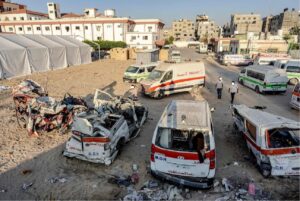Palestine Rejects Rafah Crossing Proposal Without Israeli Withdrawal
Palestine rejected a joint proposal from Israel and the U.S. to reopen the Rafah border crossing without Israeli withdrawal and Palestinian sovereignty. The proposal offered limited Palestinian involvement, but Palestinians insisted on full control as per the 2005 agreement. The rejection marked the first direct talks between Palestine and Israel in recent times, ending without further discussion. The UN called for renewed political efforts to resolve the Gaza crisis, emphasizing international law and Palestinian governance.
Meanwhile, the UN reported halted aid missions to Gaza, worsening the humanitarian situation. Hezbollah warned Israel against targeting Lebanon, linking its actions to the Gaza conflict. Lebanese officials raised concerns about escalating tensions and Israel’s violations of Lebanon’s sovereignty.

Palestine Rejects Rafah Crossing Proposal Without Israeli Withdrawal
Palestine has turned down a joint proposal from Israel and the United States to reopen the Rafah border crossing, which is located between Gaza and Egypt. The proposal suggested a temporary reopening of the crossing with limited Palestinian involvement. However, Palestine rejected the idea because it did not include the full withdrawal of Israeli forces and the establishment of Palestinian sovereignty over the crossing, which they believe is required under international agreements.
This disagreement occurred during a meeting with representatives from Palestine, the United States, and Israel. While the proposal offered a chance for Palestinians to manage the crossing to some extent, it did not allow for Palestinian control, such as raising the Palestinian flag or having their own police and security forces at the border. For Palestinians, having sovereignty over the crossing is a non-negotiable issue, as stipulated in the 2005 agreement governing the Rafah crossing. This agreement, which was signed by Israel and the Palestinian Authority, requires Palestinian control for the crossing to be managed properly and in accordance with international law.
The meeting between Israel and Palestinian representatives marked the first direct talks between the two sides in recent times. However, it ended without any further discussions after Palestine rejected the Israeli-U.S. proposal. The United Nations Secretary-General, Antonio Guterres, has called for renewed efforts toward finding a political solution to the crisis in Gaza, emphasizing the importance of a resolution that respects international law and addresses the ongoing conflict.
UN Calls for Immediate Action in Gaza
During a debate in the UN Security Council, Courtenay Rattray, speaking on behalf of the UN Secretary-General, stressed the urgent need for a political solution to the crisis in Gaza. He expressed deep concern over the escalating violence in the region, which has led to a worsening humanitarian situation. He noted that Israeli military operations in Gaza had intensified, and Palestinian armed groups continued to launch rockets toward Israeli civilian areas, exacerbating the conflict.
Rattray also highlighted the destruction of Rafah and the ongoing closure of the Rafah crossing, which is making it even harder for people in Gaza to access essential humanitarian aid. He called for an immediate halt to Israeli settlement activities, which he described as a violation of international law and a significant barrier to peace. Additionally, he urged the reinstatement of governance in Gaza under the Palestinian Authority, as a legitimate Palestinian government would be better equipped to lead efforts to rebuild the region.
Meanwhile, the UN Office for the Coordination of Humanitarian Affairs (OCHA) reported that the Israeli military had stopped all aid missions to northern Gaza, preventing vital supplies from reaching hundreds of thousands of people in need. Humanitarian workers were unable to access supplies from the northern entry point, Erez West, due to military actions that have made the area unsafe. OCHA also noted that the number of displaced people in Gaza was rising, with more individuals fleeing Gaza City and moving toward other areas like Deir al-Balah.
Hezbollah Warns Israel Amid Tensions with Lebanon
The conflict in Gaza has also affected neighboring Lebanon, with Hezbollah issuing a strong warning to Israel. In a speech marking the Islamic holy day of Ashura, Hezbollah leader Sayyed Hassan Nasrallah declared that Lebanon would not stop its conflict with Israel as long as Israel continues its attacks on Gaza. He warned Israel against targeting civilians in southern Lebanon, saying that any such actions could lead to Hezbollah launching missiles at new Israeli settlements.
Nasrallah rejected rumors of any agreements between Lebanon and Israel, emphasizing that developments on Lebanon’s border would depend on how the Gaza conflict unfolds. He stated that any end to hostilities would require negotiations led by the Lebanese state, not outside powers.
Nasrallah also blamed the United States for the deaths of Palestinian civilians, accusing the U.S. of being fully responsible for the killings because it supplies weapons to Israel. On the diplomatic front, Lebanese Foreign Minister Abdallah Bou Habib raised concerns about Israel’s intentions to escalate the conflict with Lebanon. He warned that any missteps could cause a wider regional crisis, leading to a new displacement wave affecting not only Lebanon but other parts of the Middle East and Europe.
Bou Habib also expressed alarm about Israel’s repeated violations of Lebanon’s sovereignty, noting that there had been more than 35,000 such incidents since 2006. He called for an end to cyberattacks targeting Lebanon’s infrastructure, such as Beirut airport, which he said threatened the country’s security and operations. These developments are adding to the already complex and volatile situation in the region, as tensions continue to rise across Israel, Gaza, and Lebanon.
Check out TimesWordle.com for all the latest news
You must be logged in to post a comment.